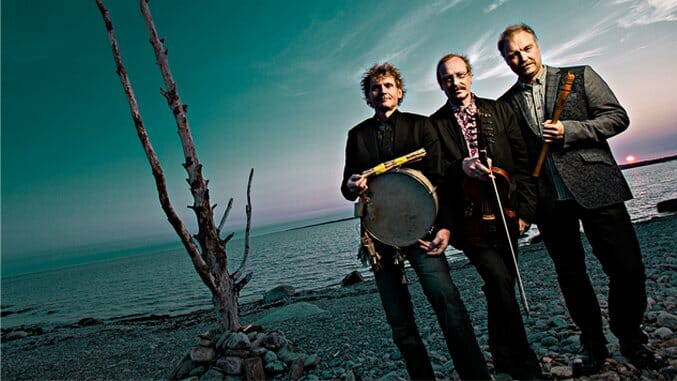7 Nordic Noir Artists to Chill Your Bones
Photo of Groupa by Peter Lloyd
The Nordic noir genre of film and television has a striking aesthetic—minimalist, streamlined architectures mixed with dark, morally twisted stories, and snowbound arctic vistas. It’s a remarkably compelling genre that’s sparked a renewal of interest in Nordic culture. Today, in Nordic countries like Iceland, Denmark, Norway, and Sweden, artists are tapping into the dark roots of the Nordic traditions that fueled this aesthetic, and melding that with the streamlined modernism of 21st century Scandinavia. The ancient ballads are coming to life again, infused with a contemporary sense of style and fashion. Here are seven artists whose Nordic noir music will bring a cold shiver to your spine.
1. Steindór Andersen & Hilmar Örn Hilmarsson
The tradition of rímur, or rhyming ballads, goes back many centuries, even millennia in Iceland, tapping into the deep Norse pagan roots of the country. Even when the church raged against these ancient ballads and their ties to the Norse gods and heroes, the Icelandic people held strong, and passed the rímur down in the oral tradition within their families and among friends. Steindór Andersen is one of the great rímur singers today, and dipping in the pop world, has notably collaborated with Icelandic indie stars Sigur Rós. One of his most accessible albums was made in collaboration with musician and composer Hilmar Örn Hilmarsson, who’s also the high priest of the Ásatrúarfélagið (the Ásatrú fellowship). The modern incarnation of the Norse pagan religion, the Ásatrú fellowship dates back to the ‘70s, but traces its roots to the furthest reaches of pagan history both in Scandinavia and abroad. On the album, Stafnbúi, Andersen sings some of his favorite old poetry, accompanied by the atmospheric and evocative compositional beds of Hilmarsson. Here, they interpret the poem “Haustid nálgast,” written by 19th century Icelandic poet Stefán frá Hvítadal. Though not an ancient source, the poem speaks to our natural world and living in harmony with it, a pagan principle of living that has survived since the old days in Iceland. Here is a tanslated excerpt:
Seek solace in the heavens you that cried,
the stars that shimmer are the rays of God
in the wintery night.
2. Torgeir Vassvik & Frikar
One of the most fascinating forms of Nordic music is the Sami joik. An improvised song akin to throat singing, it’s the hallmark of the Sami people, an indigenous, often nomadic people that live in the northern reaches of the regions. In a land of extremes, the raw-throated sounds of the joik stand out as perhaps a tie to the windswept vistas of the Arctic. Born in the far North of Norway, Torgeir Vassvik is one of the most intriguing Sami singers, and an innovative collaborator. He’s been touring recently with Norwegian hallingdans master and modern dancer Hallgrim Hansegård as Frikar. With Frikar, Vassvik’s innovative joik singing mixes with Hansegård’s athletic dance interpretations, much of which is based on the Norwegian hallingdans tradition in which dancers spin, twirl, and launch themselves to dizzying heights. Frikar’s an interesting fusion project, and there’s no denying the raw electricity of their performance together.
In this video Vassvik taps into the shamanism of Sami culture. The “wolf joik,” a song that was used in the olden days to frighten wolves away from the herds of reindeer that the Sami, was sung for survival and sustenance. Throat singing, whether done with overtones or without, is a common feature of the indigenous cultures of the Arctic, spreading all along the roof of the world.
3. Eivør
Hailing from the desolately beautiful Faroe Islands, singer and songwriter Eivør Pálsdóttir has become something of a pop phenomenon in Europe and Scandinavia. Soon she should be breaking into American households with her involvement in the upcoming God of War videogame (she sings the main theme and the new installment of the game is set amidst Norse mythology). But throughout her rise, she’s stayed true to her roots in the Faroe Islands and to her love of Faroese culture. The Faroe Islands lie in the ocean between Norway and Iceland, but are a self-governed part of Denmark. A land of rugged beauty, the Faroe Islands also play host to cultural events like the seaside G! Festival. The traditions of the Faroe Islands focus on songs and ballads, often sung for dancers. Eivør grew up with ties to Faroese folk music, but also ties to classical singing. She often writes in English or Danish, but her 2015 album Slør was made up mostly of songs written by her in the Faroese language. The song featured here, “Salt,” was written by the renowned Faroese poet Marjun Syderbø Kjælnes. You can hear Eivør’s signature blend of dark electronic beats with ethereal Scandinavian vocals here.
-

-

-

-

-

-

-

-

-

-

-

-

-

-

-

-

-

-

-

-

-

-

-

-

-

-

-

-

-

-

-

-

-

-

-

-

-

-

-

-








































